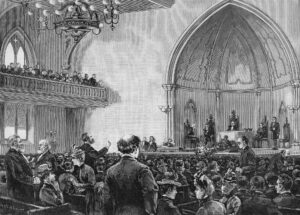It’s been over 100 days for me. How about you? My isolation started when I returned after a wonderful vacation in Florida. It was a last-minute gift, shared with three generations of a family from church. The blessing of those days has grown with each day of isolation. When I started my 14 mandatory days of quarantine, I could never have guessed I’d still be home alone three months later.
At first, it was fun. No commitments? Nowhere to go? I moved my office downstairs; my den upstairs. Shredded 20 years of files. Did my spring cleaning. Painted a bathroom. Organized and purged. So many jobs that my normal life doesn’t allow me to get to. And I counted down the days until I could play with my grandkids again.
About day nine I realized that the whole country was going into isolation and day 15––along with the days after it––were going to look just like day 14 and then all of that adrenaline was gone. Suddenly everything was hard. I like my own company; I’m used to living alone but I’m not used to being alone ALL the time.
So here I am––here we are––in a world for which we were not prepared, in our own homes for our own well-being and for the love of our neighbours. I’ve sought to be flexible with the Lord’s purposes these days. I’ve taken my ministry online. I have learned to play games through zoom with my family and to attend my small group and church online.
I’ve reminded myself how blessed we are to be experiencing this in the 21st century when these are possible, and yet there is a longing for more––for human touch––for a more natural, less awkward community. I suspect you know what I’m talking about.
What Makes Being Alone So Hard
Loneliness is real. More than that, I would hold it’s a godly response to being alone. When asked, “What is the greatest commandment,” Jesus responded, “You shall love the Lord your God with all your heart and with all your soul and with all your mind. This is the greatest and first commandment.
And a second is like it ‘You shall love your neighbour as yourself. On these two commandments depend all the Law and the Prophets,’” (Matt 22:37–40) he’s telling us we are hardwired by God for a relationship: with him first and then with others. Our relational longings are borne out of this design. Today we find ourselves in circumstances where those relationships for which we are hardwired have grown elusive.
Along with this, we have a cultural context that creates some contributing factors to the difficulty of isolation. We don’t do silence or still all that well. We tend to find our identity in our productivity and that means one way or another, making connections with people. Quiet contemplation is far more a discipline for us than a natural rhythm. Historically speaking, we are among the busiest and most widely connected people who have ever lived.
Not only are we not used to being alone all the time, but we are also not used to relinquishing control of the decisions for our lives. The aloneness has been hard but the discomfort has been heightened by the reality that it has been thrust upon us by others. For all of these reasons and others, many of us, and especially those of us who live on our own, have found the aloneness of the novel coronavirus an unwelcome affliction.
Responding to God’s Providential Purposes
In the pattern of many of the psalms, we are given the courage and wisdom to look at our difficulties in the face, to acknowledge their realities, to feel the sorrows and discomforts they cause, and then to look up. We know that the Father of mercies and God of all comfort is more than able to comfort us in all of our affliction (2 Cor 1:3–4); this affliction has not crept into our lives without his knowledge or even his tender loving care.
Not a sparrow has fallen in all of history, or even a hair from our heads, without His knowledge (Matt 10:29–31). In Hagar’s wilderness isolation, God showed himself to be the God who sees. He met her tenderly and she was strengthened. Maybe one of the blessings in this forced season of quiet is that we will learn how to more effectively draw near to God so that He can draw near to us (James 4:8) and provide us with that same comfort.
As we search for solace in the Scriptures, we are given the opportunity to peer into moments of human isolation where God met souls with compassion and healing words. Joseph had a prison, Moses had Midian, Elijah had a broom tree, there was a woman by a well, even Jesus chose a wilderness. When I give my full attention to these and many other stories like theirs, I am reminded that God chooses and uses isolation for his purposes.
God met each of these in profound ways that changed their hearts and their futures during those quiet times. They were strengthened, equipped and envisioned in ways that grew their love and trust in God profoundly and out of that love and trust grew fruitful ministry.
The regulations enforcing isolation are starting to loosen––for some––if you live in the right place and are of the correct demographic. Churches are beginning the conversation about how to gather responsibly. It would seem that isolation will soon be over, or at least, less severe.
Before it ends, before life resumes whatever version of normal we are going to experience, I’d encourage you to wait on God, to see what he has for you––what blessings this time of forced solitude are extended to you.
Questions for Reflection
- Take time to consider deeply one biblical character who experienced some measure of isolation. Read everything God has recorded about them and the encounter they had with him. Consider the new depths of trust and love they had for God, the new potential for ministry that grew out of that love and trust. Ask the Lord to use this time in your life in a similar way.
- Ask the Lord to help you consider how you might creatively love and care for someone in your sphere of influence. If you have an idea, thank him for the inspiration and then do it!





















